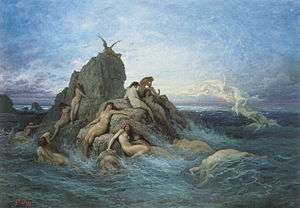Oceanid

| Greek deities series |
|---|
| Aquatic deities |
| Nymphs |
In Greek mythology and, later, Roman mythology, the Oceanids or Oceanides (/oʊˈsiːənɪdz,
One of these many daughters was also said to have been the consort of the god Poseidon, typically named as Amphitrite.[2] More often, however, she is called a Nereid.[3]
Oceanus and Tethys also had 3,000 sons, the river-gods Potamoi (Ποταμοί, "rivers").[4]
List of Oceanids
Some notable Oceanids include:
- Metis, Zeus' first wife, whom Zeus impregnated with Athena and then swallowed.[5]
- Eurynome, Zeus' third wife, and mother of the Charites.[6]
- Doris, the wife of Nereus and mother of the Nereids.[7]
- Callirhoe, the wife of Chrysaor and mother of Geryon.[8]
- Clymene, the wife of Iapetus, and mother of Atlas, Menoetius, Prometheus, and Epimetheus.[9]
- Electra, wife of Thaumas and mother of Iris and the Harpies
- Perseis, wife of Helios and mother of Circe, and Aeetes.[10]
- Idyia, wife of Aeetes and mother of Medea.[11]
- Styx, goddess of the river Styx, and the wife of Pallas and mother of Zelus, Nike, Kratos, and Bia.[12]
Sailors routinely honoured and entreated the Oceanids, dedicating prayers, libations and sacrifices to them. Appeals to them were made to protect seafarers from storms and other nautical hazards. Before they began their legendary voyage to Colchis in search of the Golden Fleece, the Argonauts made an offering of flour, honey and sea to the ocean deities, sacrificed bulls to them and entreated their protection from the dangers of their journey.[13]
Oceanids in the arts
Jean Sibelius wrote an orchestral tone poem called Aallottaret (The Oceanides) in 1914.
The Manchester-born painter Annie Swynnerton, the first woman to be admitted to the Royal Academy in 1922, painted a work called Oceanid some time before 1908. It shows a strong, unidealised female figure at one with nature, typical of Swynnerton's many depictions of 'real' women and her feminist politics.

See also
Notes
- ↑ Hesiod, Theogony, 346 ff
- ↑ Bibliotheca 1.8
- ↑ Hesiod Theogony 243; Bibliotheca 1.11
- ↑ Hesiod Theogony 337
- ↑ Hesiod, Theogony 886–900; Apollodorus, 1.3.6.
- ↑ Hesiod, Theogony 907–909; Apollodorus, 1.3.1. Other sources give the Charites other parents, see Smith, s.v. Charis.
- ↑ Hesiod, Theogony 240–264; Apollodorus, 1.2.7.
- ↑ Hesiod, Theogony 286–288; Apollodorus, 2.5.10.
- ↑ Hesiod, Theogony 351, however according to Apollodorus, 1.2.3, another Oceanid, Asia was their mother by Iapetus.
- ↑ Hesiod Theogony 956–957; Apollodorus, 1.9.1.
- ↑ Hesiod, Theogony 958–962; Apollodorus, 1.9.23.
- ↑ Hesiod, Theogony 383–385; Apollodorus, 1.2.4.
- ↑ Kemp, p. 611
References
- Apollodorus, Apollodorus, The Library, with an English Translation by Sir James George Frazer, F.B.A., F.R.S. in 2 Volumes. Cambridge, Massachusetts, Harvard University Press; London, William Heinemann Ltd. 1921. Online version at the Perseus Digital Library.
- Hesiod, Theogony, in The Homeric Hymns and Homerica with an English Translation by Hugh G. Evelyn-White, Cambridge, Massachusetts., Harvard University Press; London, William Heinemann Ltd. 1914. Online version at the Perseus Digital Library.
- Kemp, Peter (1979). The Oxford Companion to Ships & the Sea. Oxford University Press. ISBN 978-0-586-08308-6.
- Smith, William; Dictionary of Greek and Roman Biography and Mythology, London (1873).